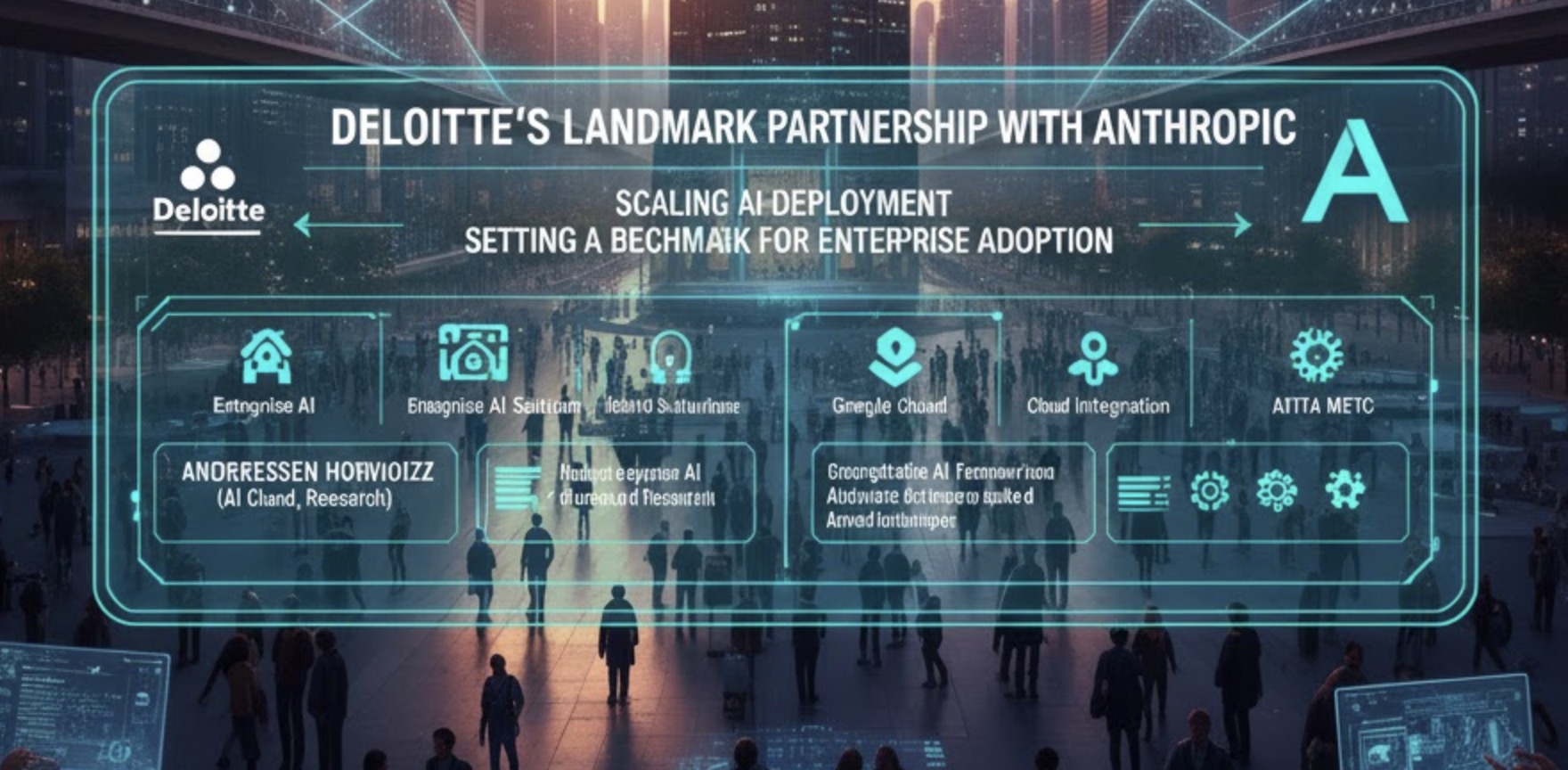Introduction
On 6 October 2025, Anthropic and the global professional‑services firm Deloitte announced an ambitious expansion of their partnership. Anthropic will provide its Claude generative‑AI assistant to more than 470 000 Deloitte employees across over 150 countries, making this the largest enterprise deployment of the company’s technologyanthropic.com. The collaboration will not simply offer a generic chatbot; Deloitte plans to create role‑specific “personas” so that accountants, software developers, consultants and other specialists can use Claude for tasks ranging from financial analysis to coding and document draftingtechbuzz.aimitrade.com. This landmark deal signals how far generative AI has progressed from pilot projects to becoming core infrastructure in professional services, and it raises important questions about responsible deployment and industry‑wide implications.

Top picks for "deloitte landmark partnership"
Open Amazon search results for this keyword.
As an affiliate, we earn on qualifying purchases.
Background: How Deloitte and Anthropic Arrived Here
Deloitte has been investing in generative AI for several years. In July 2024 the firm and Anthropic announced a strategic alliance to build enterprise‑grade AI solutions for clients in both commercial and government sectorsdeloitte.com. That announcement highlighted Deloitte’s Trustworthy AI™ framework, which aligns with Anthropic’s Constitutional AI training approach, as a foundation for building models with ethical safeguardsdeloitte.com. To support this collaboration, Deloitte planned to train more than 15 000 professionals on Anthropic’s Claude model familydeloitte.com, and it began developing Claude‑powered applications such as C‑Suite AI for CFOsdeloitte.com.
The relationship deepened in April 2025, when Deloitte launched a Generative AI and advanced AI applications certification program in partnership with Anthropic. The program aims to certify 15 000 practitioners globally and provides hands‑on training on Claude models and Constitutional AI principlesdeloitte.com. It is part of Deloitte’s Project 120 $1.4 billion investment in workforce developmentdeloitte.com and feeds into the Deloitte AI Academy™, which has already trained more than 120 000 professionalsdeloitte.com.
Anthropic has also experienced rapid growth. The company closed a $13 billion funding round in September 2025, pushing its valuation to $183 billionimplicator.ai. Around the same time it released Claude Sonnet 4.5, a model optimized for coding and autonomous tasksimplicator.ai. Anthropic serves over 300 000 business customerstechbuzz.ai and is tripling its international workforce to meet demandallwork.space. Despite this momentum, the company competes in a crowded field that includes OpenAI and Google.
The New Deal: Scale, Specialization and Infrastructure
Global Roll‑Out
The October 2025 announcement expands the alliance dramatically. Deloitte will provide Claude to 470 000 employees across its global network, covering 150 countriestechbuzz.ai. Anthropic notes that this is its largest enterprise AI deployment to dateanthropic.com, eclipsing the size of many vendors’ entire customer bases. Deloitte’s existing presence—serving nearly 90 % of the Fortune Global 500deloitte.com—means the deal not only equips its own workforce but also positions Deloitte to embed Claude into client projects across major industriesimplicator.ai.
Role‑Specific “Personas”
A distinctive feature of the rollout is Deloitte’s commitment to customized AI personas. Instead of offering a generic assistant, Deloitte will build specialized versions of Claude for various job functions: accountants will use tools geared toward financial analysis, while software developers will receive coding‑oriented assistantstechbuzz.ai. These personas include tailored prompts, knowledge bases and output formatsimplicator.ai, reflecting the recognition that generative AI must be context‑aware to maximize productivity.
Claude Center of Excellence and Certification
To support adoption and guard against misuse, Deloitte is establishing a Claude Center of Excellence. This hub will develop implementation frameworks, share best practices and provide technical support, helping teams move from pilot projects to large‑scale deploymentanthropic.com. It will also staff 15 000 certified practitioners who will serve as implementation specialists, designing Claude deployments for clients and managing compliance requirementsimplicator.aiimplicator.ai. The remaining employees will use Claude primarily for productivity tasksimplicator.ai. By investing heavily in training and certification, Deloitte aims to cultivate an internal AI culture and ensure that consultants can credibly advise clients on their own AI journeysmitrade.com.
Compliance and Regulated‑Industry Solutions
A central goal of the partnership is to build AI solutions suited for highly regulated industries. Deloitte’s Trustworthy AI™ framework, which emphasizes governance, transparency and risk management, will be combined with Claude’s safety‑first designdeloitte.com. Proposed use cases include:
- Financial services – automated compliance monitoring, intelligent financial analysis and drafting investor documentationdeloitte.com;
- Government – emergency response coordination using real‑time data and policy analysis assistancedeloitte.com;
- Healthcare – personalized treatment plans and medical research summarizationdeloitte.com.
By embedding AI into these critical functions, Deloitte aims to increase productivity, accuracy and decision‑making while maintaining regulatory compliancedeloitte.com.
Strategic Significance: Distribution and Competitive Dynamics
A Distribution Machine for Anthropic
Analysts note that the deal functions less like a traditional software license and more like a distribution strategy. By embedding Claude within a Big Four consultancy, Anthropic gains access to 90 % of Fortune 500 boardroomsimplicator.ai. Deloitte’s consultants will effectively act as evangelists and integrators, recommending Claude to clients and building custom implementationsimplicator.ai. This channel model creates deep integration—with certified staff, compliance frameworks and custom workflows—that raises switching costs and makes it harder for clients to substitute another AI providerimplicator.ai.
Shifting from Pilot Projects to Core Infrastructure
The deployment marks a shift from the early “pilot theater” phase of enterprise AI to production‑level plumbingimplicator.ai. The Center of Excellence, training programs and role‑specific personas are designed to prevent projects from stalling in compliance reviews or change‑management bottlenecksimplicator.ai. According to TechBuzz, the deal demonstrates that enterprise AI competition has moved beyond product features to focus on integration depth and complianceimplicator.ai. With nearly half a million users across various functions, Anthropic will gather invaluable data on how generative AI performs at scale, informing future model developmenttechbuzz.ai.
Responding to Competitive Pressure
The timing of the rollout follows Anthropic’s fundraising surge and the release of Claude Sonnet 4.5implicator.ai. It is also a strategic response to competition from OpenAI and Google. Whereas OpenAI pursues broad adoption through ChatGPT Enterprise and consumer offerings, Anthropic is betting on deep integration with a few partners—embedding its models within organizations that can standardize and scale them across clientsimplicator.ai. If successful, this model could create a moat built on compliance, training and integration, making it difficult for rival models to displace Claude even if they offer lower per‑token costsimplicator.ai.
Implementation Challenges and Ethical Considerations
Despite its promise, the deployment highlights the risks associated with AI in professional settings. TechCrunch reported that on the same day Deloitte announced the Claude rollout, it agreed to refund a government client for a report containing AI‑generated errors and hallucinated citationstechcrunch.com. The incident underscores the need for rigorous quality control, as generative models can produce plausible‑sounding but incorrect information. Similar issues have plagued other organizations using AI, from media outlets publishing hallucinated book lists to internal AI tools misinforming employeestechcrunch.com.
Deloitte and Anthropic have responded by emphasizing trustworthy AI frameworks. Deloitte’s Trustworthy AI™ approach provides guidance on governance, transparency, and fairnessdeloitte.com, while Anthropic’s Constitutional AI uses carefully designed rules to reduce harmful or biased outputsdeloitte.com. The training and certification programs aim to ensure that employees understand both the capabilities and limitations of AI, fostering a culture where human oversight remains essential.
Implications for the Professional‑Services Industry
Consulting as a Channel for AI
The deal demonstrates that consulting firms are becoming major distribution channels for generative AI. Rather than selling models directly to end‑users, vendors like Anthropic see value in partnering with integrators that can embed AI across multiple clientsimplicator.ai. This approach leverages consultants’ domain expertise and existing relationships, which are critical for navigating complex regulatory landscapes. If Deloitte’s model proves successful, other Big Four firms may build similar centers of excellence and certify thousands of practitionersimplicator.ai.
Mainstreaming AI Adoption
Deploying Claude to nearly half a million employees across diverse functions signals that AI adoption has entered the mainstream. When a leading professional‑services firm integrates AI into everyday workflows, it sends a strong message to other enterprises that generative AI is no longer experimental but a core capability. The scale of the deployment also indicates that enterprise deals can outweigh consumer adoption in shaping the AI marketimplicator.ai.
Balanced Optimism and Caution
The partnership illustrates both the promise and perils of enterprise AI. On the one hand, custom personas, training programs and regulated‑industry solutions promise significant productivity gains and new revenue streams. On the other hand, high‑profile errors and hallucinations serve as reminders that AI tools must be deployed responsibly. The success of the rollout will depend on how effectively Deloitte can manage change, ensure data security, maintain ethical standards and deliver measurable valueimplicator.ai.
Conclusion
Deloitte’s decision to equip its 470 000‑person workforce with Anthropic’s Claude assistant marks a watershed moment in enterprise AI adoption. It builds on earlier collaborations that focused on training and ethical frameworks, and it sets a new benchmark for scale and integration. By creating role‑specific AI personas, establishing a comprehensive Center of Excellence, and certifying thousands of practitioners, Deloitte aims to embed AI deeply into its own operations and those of its clients. For Anthropic, the partnership transforms a single customer engagement into a powerful distribution channel that reaches the boardrooms of the Fortune 500 and illustrates a strategic shift toward deep, regulated‑industry integration. While the deployment underscores AI’s transformative potential, it also highlights the necessity of robust governance and human oversight to prevent misuse and ensure that the technology delivers reliable and responsible outcomes.









